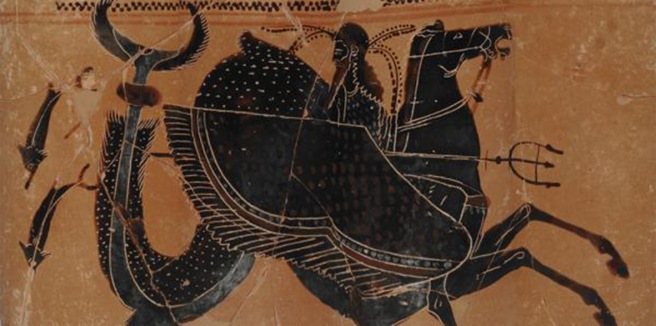The Greek Gods- what if they were alive today? My personal view is that the polytheism of the Greeks gives us a rich language in which to describe experience.
For us the sea is much more sea-side than ocean. A place for gull-wary picnicking, strolling in the replenishing early light at low tide, brave wading, wetsuit bathing, ruminative beach-combing, moon gazing, ice-cream scoffing. The greatest danger is losing keys in the rippling pebbles.
The rare and shocking times when the sea is chosen as a place to end life seems our only reminder of Poseidon. He was originally a chthonic god, a deity of the earth, who took the sea as his portion when Zeus divided up the universe. (Brother Hades took the underworld, Zeus took the sky.) God of earthquakes, of floods, storms, hurricanes, Poseidon is a god of the unpredictable, of elemental, irresistible mobility. His nature is irredeemably riven and turbulent with scarcely repressible conflict. With a retinue of numerous fish-tailed horses (hippocampi), tritons and sea monsters, it takes as many nurturing sea-nymphs and dolphins to keep a degree of harmony and fecundity possible in the depths.

Unlike Apollo, a god whose intentions were clear, if not always good, Poseidon’s were mired in a volcanic anger. If crossed he was incapable of restraint: his trident would split a rock and produce a torrent from its eon-compacted depths, or he’d hurl a fragment of cliff, even an entire island, to bury an opponent.
Ancient cosmology thought the oceans encircled the earth (as they do), giving one deity far too much power – Poseidon couldn’t tolerate any sense of containment. Unable to relinquish his rights over the underworld and sky, he continually sent sailors to their deaths, sent winds to disrupt the sky, sent floods and earthquakes to rend the land.The bull, the ultimate symbol of power in the ancient world, was his sacred animal, but so too was the horse.
It’s not hard to see why this might be so. There must have been a time when horses changed lives as much as the aeroplane has for us. In fact, just to prove that Poseidon’s limitless imagination had embraced the idea of air travel, his son by the gorgon Medusa, was was the winged horse Pegasus. Horses were the epitome of speed and power to the ancients and by analogy, ships which ride the waves are like sea-chariots and a chariot was Poseidon’s choice of vehicle and one which so deftly skimmed the waves its axles remained dry. It was a ship with the grace and invincible speed of a Bugatti.
At the founding of Athens, he offered the horse as his gift. Athena offered the olive. The olive is a clear winner, for while the horse has been superseded many times, the olive has stayed pivotal to the Greek economy. Athena of course knew this because she has the far-sighted vision of an owl and a strategic brain. Poseidon’s focus is inevitably thrown by his relentless turmoil. Always a poor loser, he flooded the Erechtheum.
His presence is a constant threat in the first part of the Odyssey while Odysseus is travelling; even Zeus waits until the irascible Poseidon is visiting the Ethiopians before he agrees to release Odysseus from Calypso’s power and send him home. Homer constantly refers to the ocean as ‘atrugeton ponton’ which is often translated rather ambiguously as ‘unharvestable sea’. It refers to the way the sea cannot in any way be shaped by man. It can’t be ploughed. Kerouac calls it the ‘farmless sea’ in Big Sur. In contrast modern technologies, especially those facilitating speedy forms of transport, have enabled a harvesting of our environments in denial of their interconnection, their reciprocity. We need to respect the potency of Poseidon, harness the vision of Athena and apply the focus of Apollo.
Published in Hastings Independent Press June 16 2020

